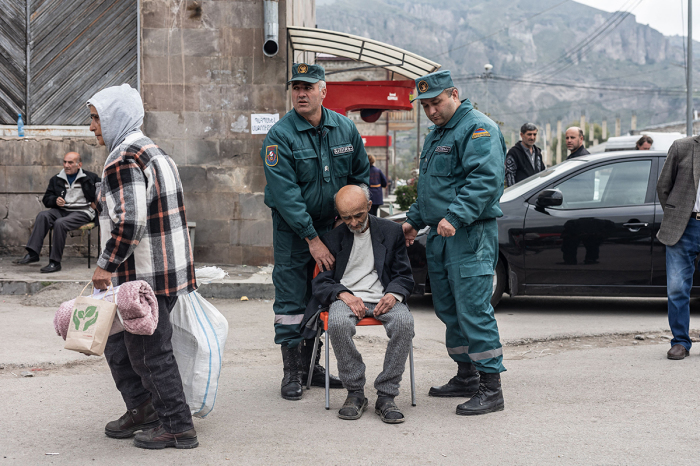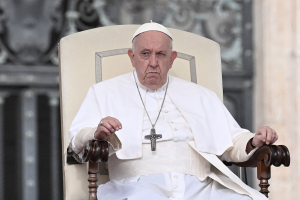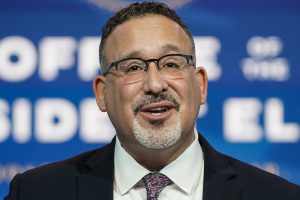USCIRF labels Azerbaijan a top religious freedom violator for the first time

A bipartisan watchdog committee has for the first time urged the U.S. State Department to include Azerbaijan on its list of the world's worst religious freedom violators as it calls on the agency to take a stronger stance against violations in several countries, including Nigeria and India.
The U.S. Commission on International Religious Freedom released its 2024 Annual Report Wednesday, coinciding with the 25th anniversary of the passage of the International Religious Freedom Act of 1998. The legislation mandated the creation of the bipartisan panel of experts known as USCIRF and an annual report documenting religious freedom conditions worldwide.
This year's report lists more than two dozen countries as among the world's worst violators of religious freedom, urging the State Department to list them as "countries of particular concern."
IRFA defines countries of particular concern as "countries where the government engages in or tolerates 'particularly severe' violations of religious freedom." The designation could result in sanctions or other diplomatic actions to encourage foreign governments to prevent religious freedom violations.
Examples of "particularly severe" violations of religious freedom include "systematic, ongoing, [and] egregious violations" such as "torture or cruel, inhuman, or degrading treatment or punishment," "prolonged detention without charges" and "causing the disappearance of persons by the abduction or clandestine detention of those persons."
The countries recommended for placement on the list of CPCs compiled by the State Department on an annual basis include 12 of the 17 countries included on the State Department's 2023 list of CPCs: Burma, China, Cuba, Eritrea, Iran, Nicaragua, North Korea, Pakistan, Russia, Saudi Arabia, Tajikistan and Turkmenistan.
Additionally, USCIRF recommends that the State Department add five additional countries to the list in 2024: Afghanistan, Azerbaijan, India, Nigeria and Vietnam.
Azerbaijan
This year's annual report marked the first time Azerbaijan was recommended for designation as a CPC. Since 2020, the commission has listed Azerbaijan on its Special Watch List, a tier 2 designation.
But in 2023, USCIRF found that religious freedom conditions in Azerbaijan "trended negatively" in the aftermath of the Nagorno-Karabakh territorial conflict, which was mostly ethnic Armenian Christians before a mass exodus in 2023 amid what some experts have labeled "ethnic cleansing."
"The government continued to pose a threat to religious sites in and around the region of Nagorno-Karabakh," the report states. "In May, the chairman of the official State Committee for Work on Religious Affairs Mubariz Gurbanli urged Armenian Apostolic priests to leave the Dadivank Monastery located in the Kalbajar region, falsely claiming that they had no ties to the religious site."
"Although a United Nations mission to the city of Khankendi in October concluded that it 'saw no damage … to cultural or religious structures,' other organizations remained concerned by the potential for damage or destruction in the region," the report continues. "In November 2023, Caucasus Heritage Watch (CHW), a research initiative supported by Cornell University, reported damage to the historical Meghretsots Holy Mother of God Church in Shusha. That same month, CHW released satellite imagery that indicated probable damage to two Armenian cemeteries also in Shusha."
USCIRF also stated that the government continued to enforce its 2009 law requiring the registration of religious groups to legally engage in worship. The government also "mandated the official review and approval of religious literature and other materials, and restricted who could engage in 'religious propaganda,' or missionary activity, among other limitations."
"In keeping with the previous year, the government yet again refused to register any non-Muslim religious community despite continued efforts by Protestant Christians and Jehovah's Witnesses to obtain official registration," the report added.
Muslims did not escape persecution from the government either, as "authorities continued to exert pressure on Muslims related to their religious activities, and they surveilled, fined, detained, and arrested those considered to have violated Azerbaijan's religious regulations."
"In our 2022 and 2023 annual reports, we noted increasing religious freedom violations by the government of Azerbaijan. Regrettably, this trend continued during 2023, leading USCIRF to conclude that the CPC designation had now been met," USCIRF Commissioner Stephen Schneck said during a press conference Wednesday.
"USCIRF documented a significant and alarming increase in the number of prisoners arrested on the basis of religion or belief in Azerbaijan during the year. In addition, authorities are regularly accused of torturing or threatening sexual violence to elicit false confessions from detainees with those perpetrating such violence facing no accountability."
USCIRF recommends that the U.S. government work with the government of Azerbaijan to revise the 2009 religion law, amended in 2022, "to comply with international human rights standards." USCIRF also wants funding for the U.S. Agency for International Development and the U.S. Embassy in Baku to "restore, preserve, and protect places of worship and other religious or cultural sites in Nagorno-Karabakh and surrounding territories."
India
USCIRF Commissioner David Curry elaborated on the reasons behind recommending India as a CPC.
"In 2023, the Indian government at the national, state and local levels continued to promote and enforce religious nationalist policies," he stated. "This includes restrictions on citizenship, religious conversion, [and] interfaith marriage."
"These laws and policies negatively impact Muslims, Christians, Sikhs" and others, he maintained. "They've also created a culture of impunity for nationwide campaigns of harrassment and violence, particularly towards Muslims and Christians."
Curry said, "Several mosques were destroyed in the presence of police" and "hate speech against Muslims continued at an alarming rate ahead of national elections, contributing to vigilante violence."
As it has in previous years, the Indian government pushed back on USCRIF's claims, with India's Ministry of External Affairs spokesperson Randhir Jaiswal calling the report "propaganda on India."
Nigeria
As the State Department faced sharp criticism when it failed to designate Nigeria as a CPC earlier this year, USCIRF Commissioner Eric Ueland said the commission "continued to see deteriorating religious freedom conditions there, including mass violence, killings and the enforcement of blasphemy laws."
Ueland described how "central government failure, state government level repression and religiously motivated violence by non-state actors have turned parts of Nigeria into areas of extreme persecution, particularly in the north."
He lamented "the consistent failure of the Nigerian government to prevent or punish widespread violence impacting religious freedom in Nigeria."
In addition to countries on the list of CPCs, USCIRF recommended that the State Department place 11 countries on its Special Watch List for committing "severe" violations of religious freedom.
The report advised the State Department to keep Algeria on the SWL and urged the U.S. government to add Egypt, Indonesia, Iraq, Kazakhstan, Kyrgyzstan, Malaysia, Sri Lanka, Syria, Turkey and Uzbekistan to the list.
Non-state entities recommended for designation as entities of Particular Concern are "al-Shabaab, Boko Haram, Hay'at Tahrir al-Sham (HTS), the Houthis, Islamic State Sahel Province (IS Sahel), Islamic State in West Africa Province (ISWAP) (also referred to as ISIS-West Africa), and Jamaat Nasr al-Islam wal Muslimin (JNIM)."
"While 25 years has passed since USCIRF was created, it is more important now than ever to ensure that promoting freedom of religion or belief remains a key tenet of U.S. foreign policy," USCIRF Chair Rabbi Abraham Cooper said in a statement.
Ryan Foley is a reporter for The Christian Post. He can be reached at: ryan.foley@christianpost.com




























